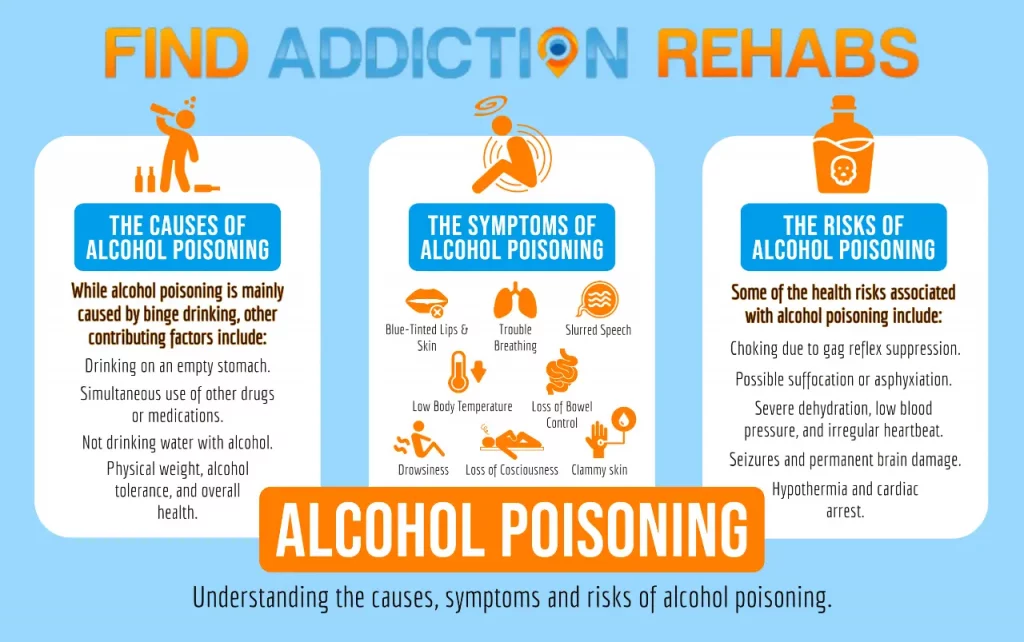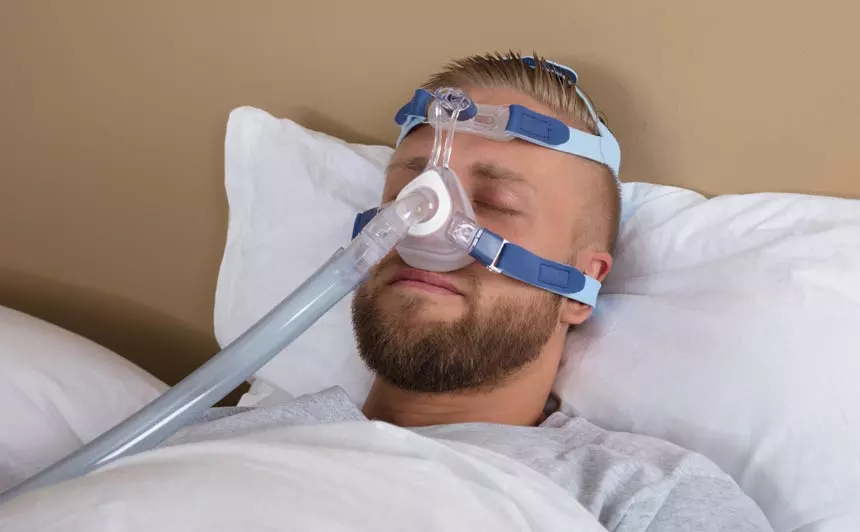What is Alcohol Poisoning?
Table of Contents
- What is Alcohol Poisoning?
- What Causes Alcohol Poisoning
- What Constitutes Binge Drinking?
- The Rise of Alcohol Abuse and Alcohol Poisoning Rates in the U.S.
- How Does Alcohol Affect the Body?
- What Increases a Person’s Risk of Alcohol Poisoning?
- How Is Alcohol Poisoning Diagnosed?
- The Additional Risks of Alcohol Poisoning
- How Is an Alcohol Overdose Treated?
- How Can I Responsibly Drink Alcohol?
- How to Recognize the Signs of Alcohol Abuse
- Alcohol Addiction Treatment Methods
- Find Alcohol Addiction Treatment Now
- Medically Reviewed By
Alcohol poisoning is a severe and potentially fatal condition that can result from drinking too much alcohol, particularly within a short period of time. If someone is suffering from acute alcohol poisoning, they will need immediate medical attention.
Alcohol poisoning may also be caused by the accidental or intentional consumption of certain household products containing alcohol; this is most commonly seen in young children and teenagers, but can also occur amongst older individuals.
What Causes Alcohol Poisoning
Sometimes called alcohol overdose, alcohol poisoning most often occurs when a person drinks too much, too quickly. This is referred to as binge drinking, a habit commonly associated with those who struggle with an alcohol use disorder.
What Constitutes Binge Drinking?
Someone’s alcohol consumption can be qualified as binge drinking if they have had two-three times their recommended number of alcoholic drinks within a singular occasion. For men, this equals around five drinks, and around four beverages for women.
This behavior may be particularly common when participating in social or celebratory events, especially those in which drinking games or heavy pressure to consume large amounts of alcohol are present.
While anyone can binge drink, this is more common amongst those with a drinking problem, as they will likely require more alcohol in order to experience the same pleasurable effects as those who do not struggle with this issue.
The Rise of Alcohol Abuse and Alcohol Poisoning Rates in the U.S.
According to the National Institute on Alcohol Abuse and Alcoholism (NIAAA), within the year 2019, 25.8 percent of people ages 18 and older reported binge drinking within the month leading up to their assessment.
In addition to these numbers, the Centers for Disease Control and Prevention (CDC) also found that around 2,300 people die each year from alcohol poisoning; deaths, which, could have been preventable with the right medical assistance.
How Does Alcohol Affect the Body?
Alcohol is most commonly found in the form of ethanol (ethyl alcohol), an ingredient often presents in alcoholic beverages, mouthwash, extracts, certain medications, and various household products.
Other forms of alcohol, such as isopropyl alcohol (including that found in rubbing alcohol), methanol, or other forms of this substance can all also result in alcohol poisoning that will warrant medical intervention.
Whereas food may take hours to digest, alcohol is rapidly absorbed by the body, and often takes far more time to be removed. Depending on how much alcohol a person drinks, this substance can remain in the bloodstream even into the next day following a drinking occasion.
When drinking alcohol – particularly when consuming excessive amounts in a short period of time – the body does not have enough time to properly process this substance. This will result in significant physical and mental impairment and, of course, potentially fatal alcohol poisoning.
What Increases a Person’s Risk of Alcohol Poisoning?
In addition to the risk presented by binge drinking, there are several other factors that may make someone more likely to develop alcohol poisoning. These may include:
- Drinking on an empty stomach.
- Drinking while taking prescription medications.
- Illicit use of other drugs while drinking.
- Not consuming enough food or water while drinking.
- Physical weight, alcohol tolerance, and overall health.
How Is Alcohol Poisoning Diagnosed?
Someone who is believed to be experiencing alcohol poisoning will be thoroughly examined by the hospital or emergency personnel in order to determine what side effects they are experiencing, as well as how severe their condition is.
This will include checking for visible alcohol poisoning effects, as well as conducting blood and urine tests to assess the individual’s blood alcohol levels or other signs of alcohol toxicity, including low blood sugar.
Blood Alcohol Concentration
An individual’s blood alcohol concentration (BAC) is used to determine the amount of alcohol that is present in their blood after drinking. These levels can range between 0% (no alcohol present) and over 0.4%, which constitutes a potentially fatal level of this substance.
For individuals who are suffering from alcohol poisoning, their BAC will likely fall between 0.30%-0.40%. This level will produce several adverse side effects, many of which will require immediate medical help.
Signs of Alcohol Poisoning
In addition to testing their blood alcohol level, medical personnel will likely also look for visible alcohol poisoning signs and symptoms. These may include clammy skin, slow breathing, pale skin, severely slurred speech, loss of consciousness, or difficulty remaining conscious.
In more severe cases, individuals may lose bowel control. Furthermore, the amount of alcohol they have consumed will likely prevent the proper flow of oxygen throughout their body, often causing blue-tinged skin and lips and low body temperature (hypothermia).
The Additional Risks of Alcohol Poisoning
When left unmanaged, several symptoms of alcohol poisoning may lead to more severe complications, including:
- Gag Reflex Suppression. Because alcohol can make a person vomit, a major risk of alcohol poisoning is its ability to depress one’s gag reflex. This means that if an individual does throw up, they may be more likely to choke on his or her own vomit.
- Trouble Breathing. Someone who is not breathing properly, or is more likely to accidentally inhale vomit into their lungs, will be at an increased risk of a dangerous and potentially life-threatening interruption of their oxygen supply (asphyxiation).
- Severe Dehydration. Vomiting or not drinking water with alcohol can cause severe dehydration, which may result in low blood pressure and a dangerously fast heart rate.
- Seizures. Alcohol poisoning can cause a person’s blood sugar levels to drop, significantly increasing their risk of experiencing a seizure.
- Hypothermia. Someone who is experiencing a drop in their body temperature due to alcohol poisoning may develop hypothermia, or experience cardiac arrest as a result of this.
- Irregular heartbeat. Alcohol poisoning can cause an abnormally fast or slow heart rate, and may even cause a person’s heart to stop beating completely.
- Permanent brain damage. Someone who regularly drinks heavily and experiences alcohol poisoning, as a result, will be more likely to develop irreversible brain damage.
With all of the above-mentioned risks, each of these potential side effects has been found to be causing factors in various alcohol poisoning deaths. Thus, if you believe that you or someone else is suffering from alcohol poisoning, it is important to seek medical assistance immediately.
How Is an Alcohol Overdose Treated?
If you recognize any of the signs and symptoms of alcohol poisoning in yourself or another person, the first step to treating this issue will be calling 911 or your local emergency number immediately.
It is important to try to keep the affected person awake while waiting for help to arrive. A cold shower may help maintain consciousness; however, this is not recommended if the individual has a low body temperature.
When dealing with an unconscious person, supporting his or her head can help prevent injury in the event of a seizure. Once safely in the hands of medical professionals, the treatment process for this condition will typically include various levels of clinical support and care, including:
- Careful monitoring of vital signs.
- Preventative measures for choking hazards.
- Oxygen therapy and support.
- Administration of fluids through an intravenous drip.
- Provision of vitamins and glucose to help prevent damage to the digestive system and other health complications.
How Can I Responsibly Drink Alcohol?
There are several easy ways to avoid alcohol poisoning, the first of which is to simply just not drink. Of course, this may not always be a possible or appealing option for many people. In these cases, drinking in moderation will be essential for their safety.
Making sure to have plenty of food and water while drinking can also help prevent serious side effects, as well as help prevent those which may carry over into the next day – a common consequence known as a “hangover.”
Drinking in a safe and supportive environment – particularly one where one or more sober individuals will be present – is also a good way to prevent alcohol poisoning, as well as its consequences should this occur.
This way, if someone does experience alcohol poisoning, or any other negative side effects from drinking, their sober companions will be able to help or seek assistance for them.
How to Recognize the Signs of Alcohol Abuse
When it comes to those who drink alcohol in potentially dangerous ways, these habits may not be limited to a singular occasion. In these cases, these individuals may be struggling with an addiction to alcohol.
Signs that may indicate whether you or a loved one may have an addictive relationship with drinking can be physical, behavioral, or mental, and may include:
- Often consuming alcohol in larger amounts or for longer periods of time than originally intended.
- Spending excessive amounts of time and money acquiring, using, or recovering from the effects of alcohol.
- Continuing to use alcohol despite this potentially causing or worsening underlying health conditions.
- Having to drink more frequently or in larger amounts in order to achieve the desired effect.
- Experiencing withdrawal symptoms when attempting to reduce or stop the use of alcohol.
If you or a loved one is exhibiting any of these behaviors, it may be a good time to seek out professional addiction treatment providers and recovery services, before these habits are able to become any worse.
Alcohol Addiction Treatment Methods
Alcohol addiction can be extremely destructive for many of those who are struggling with this condition. Fortunately, there are several treatment options available to these people today. This process will most likely start with a medically-supervised detox process.
Typically, this will be followed by continuing to receive treatment through inpatient and outpatient rehab centers. Which of these programs will best serve a person’s specific care needs will vary based on the severity of their addiction and personal background.
To learn more about the alcohol addiction treatment process and what options may work for you, it may be helpful to speak to your healthcare provider or an addiction specialist, such as a Find Addiction Rehabs representative.
Find Alcohol Addiction Treatment Now
If you believe that you or a loved one may be struggling with an addiction to alcohol, this can be a challenging and overwhelming thing to deal with. That’s why at Find Addiction Rehabs, we are dedicated to helping people like you find the treatment and recovery support they need.
Our hotline is available 24/7, so that we can connect you with professional addiction treatment providers, services, and recovery resources, anytime you need them.
So don’t wait; call our hotline today, and we will help you take the first step on your path to recovery and achieving long-term sobriety, where you can become a happier, healthier, and alcohol-free you!
Nicole Rogers is an experienced and accomplished writer with special interests in the fields of Anthropology, English, and behavioral health, and has written countless articles for newspaper publications, institutional research journals, and Find Addiction Rehabs.
Her alma mater is Florida Atlantic University in Boca Raton. Nicole hopes to spread awareness of and combat the stigmatization surrounding addiction and substance abuse treatment through her writing and work in the field.







